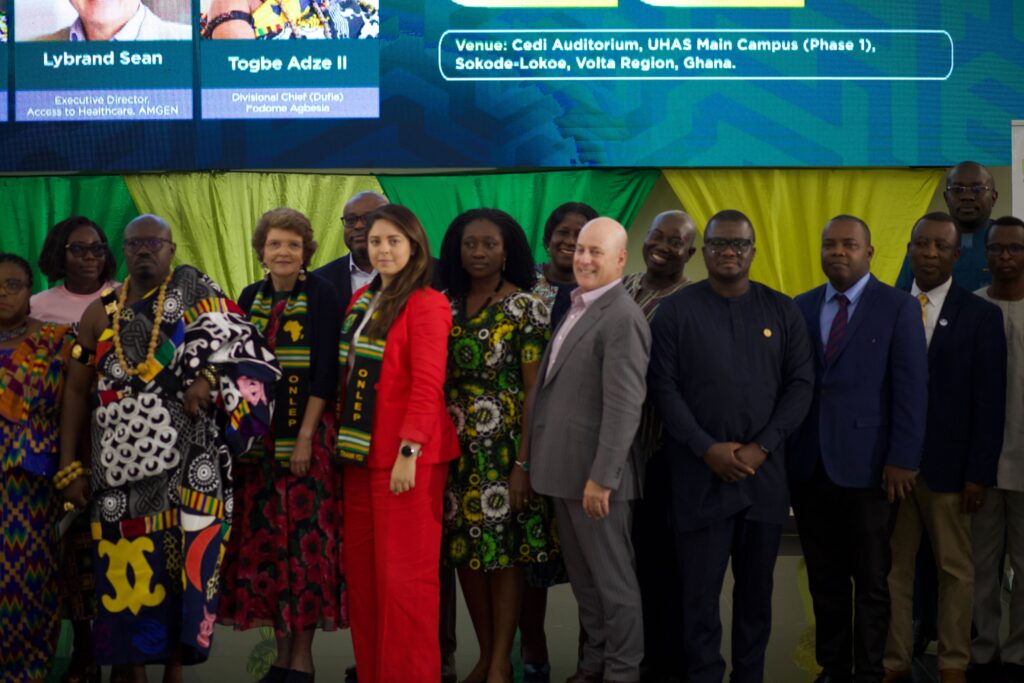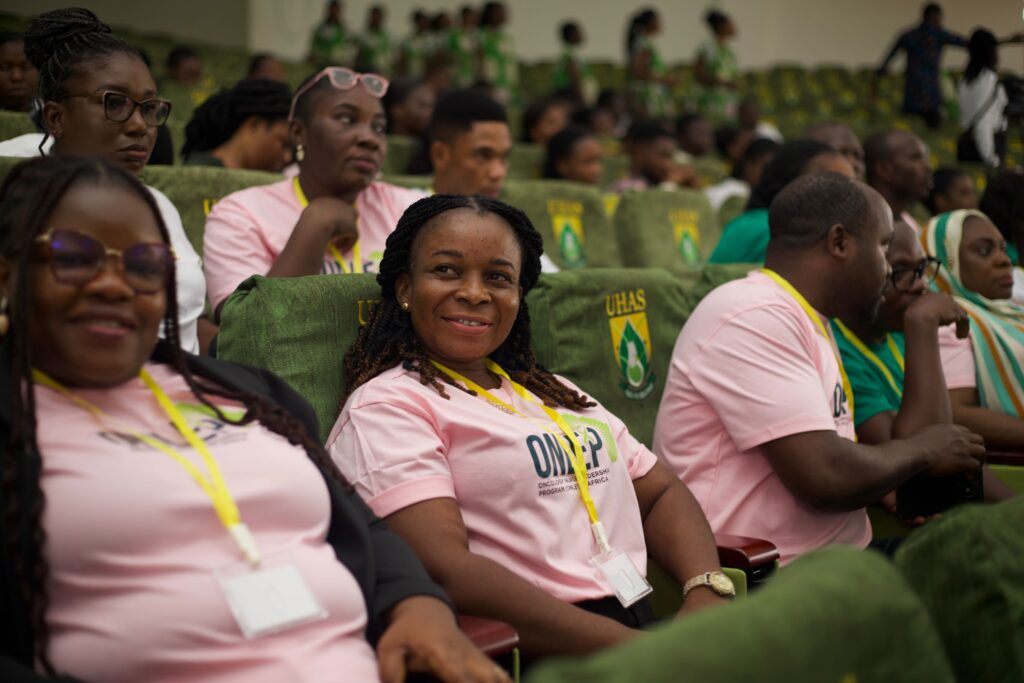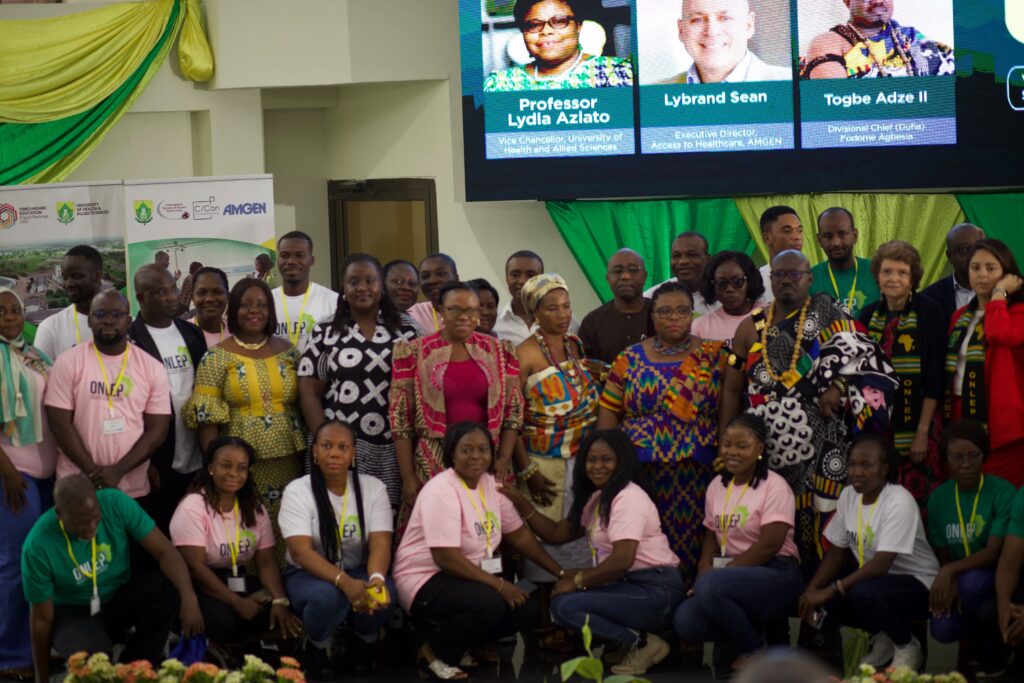
This 7th of July 2025, an event was held at the University of Health and Allied Sciences (UHAS) in Ghana to mark the launch of the new Oncology Nurse Leadership Programme (ONLEP) in Africa.
Co-developed by the UHAS, the ISNCC, C/Can and Amgen, this programme seeks to address the gap of inadequate investment in healthcare professionals delivering cancer care – specifically oncology nurses – not only in C/Can cities but across the African continent.
Although the traditional role of nurses in healthcare delivery has been well documented to have a positive impact on patient recovery, training nurses in oncology has not yet received much attention most specifically in low-and-middle income countries (LMICs). In order to maintain and increase quality cancer care in Africa, training programmes in oncology nursing and leadership to advance the capacity of local healthcare professionals and strengthen leadership mindsets is a necessary investment for the future of quality cancer care on the continent.
UHAS is poised to lead this partnership and aims to be the hub for leadership training for nurses and midwives and other health professionals in Africa and beyond. The Oncology Nurse Leadership Programme is a catalyst to this dream
Prof. Lydia Aziato. Project Lead and Vice-Chancellor, UHAS

Investing in Nursing Leadership as a Driver of Sustainable Change
ONLEP is part of C/Can’s efforts to enhance the capacity of local healthcare professionals to lead change in the healthcare sector. By addressing a real-world oncology healthcare challenge and leadership skills of nurses in Africa, C/Can and partners hope to apply a transformational learning approach. The programme aims to equip nurses with the skills, knowledge, and confidence to lead effectively in the dynamic and challenging field of oncology nursing and take up leadership roles.
At City Cancer Challenge, we believe in strong local leadership. The ONLEP Programme is a testament to our commitment to investing in the people at the heart of health systems: nurses. By empowering oncology nurses with the tools to lead, advocate, and innovate, we are not only strengthening cancer care in C/Can cities but across the African continent. Together with our partners, we empower local professionals to lead change – this is how and where sustainable impact, access, and quality cancer care begins.
Martha L. Ordóñez, Global Programme Manager C/Can
Amgen is pleased to support healthcare educational initiatives across the locations where we work, and most recently with our Access to Healthcare team – which is focused on low-resource settings where we don’t have a presence– we’re working with collaborators to continue our commitment to quality learning opportunities. To support oncology nurses across the sub-Saharan Africa region not only improves their skills and competencies; it also will lead to better healthcare delivery and in the medium-term, better health outcomes as well. We are incredibly pleased to partner with UHAS, C/Can and ISNCC on this key initiative.
Sean Lybrand, Executive Director, Access to Healthcare, Amgen Inc.
Programme Overview
By fostering leadership development skills, promoting clinical excellence, supporting professional growth, facilitating networking and collaboration, encouraging research and evidence-based practice, and nurturing advocacy skills, the Programme aims to empower oncology nurses as leaders to make a meaningful impact on cancer care delivery and patient outcomes and playing leadership roles in health delivery.
ONLEP is a 5-year programme with the first year focusing on developing the oncology nursingleadership programme in Africa and training the first cohort of 30 students, of which a total of 13 students from C/Can cities. The second, third, and fourth years will train cohorts of 60 each and the fifth year will train a final cohort of 30 students. Each year will involve monitoring and evaluation, research and stakeholder meetings.

It is estimated that each of the students in the certificate programme will spend six months with a two-week face-to-face session at the beginning and one week at the final week of the programme leading up to their graduation. The remaining weeks between these two periods will be used for online sessions.
Upon successful completion of the programme in six months, all trainees will receive a postgraduate Certificate in Oncology Nurse Leadership, recognising their achievement and expertise in leading excellence in oncology healthcare. This will also include writing and completing a required leadership project work within 6 months. The postgraduate certificate awarded by the University will be recognised across the African continent and globally.
Translating ISNCC mission ‘to maximise the influence of nursing to reduce the global burden of cancer’ requires concrete initiatives. The ONLEP in Africa is precisely that action. It strategically builds the capacity of nurses to lead, advocate, and implement solutions that directly impact cancer prevention, treatment, survivorship and palliative care outcomes across diverse settings
Prof. Winnie So, ISNCC President
First Cohort Face-to-Face Session
The two-week face-to-face session for the first cohort of the Oncology Nursing Leadership Programme is taking place in Ghana at the UHAS from the 29th of June to the 12th of July, 2025. This first face-to face training week is seeing 30 students from seven countries (Ghana, Nigeria, Malawi, Rwanda, South Africa, Kenya and Gambia). The week’s session involves lectures, group discussions, student-led presentations and role plays. The six modules of the programme Foundations of Oncology Nurse Leadership Development, Health Services Organization, Financial Management and Quality Assurance, Psycho-oncology, Stress and Change Management, Networking and Collaboration, Research and Evidence-based Practice and Policy and Advocacy will be discussed.
This programme is more than just a learning experience, it’s a bridge connecting nurses from diverse backgrounds and countries, empowering us to share our stories and learn from each other.”
Ejiaku Tochukwu Chiamaka, Cohort 1 Lead, Abuja, Nigeria.






